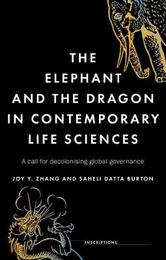
|
The Elephant and the Dragon in Contemporary Life Sciences: A Call for Decolonising Global Governance
Hardback
Main Details
| Title |
The Elephant and the Dragon in Contemporary Life Sciences: A Call for Decolonising Global Governance
|
| Authors and Contributors |
By (author) Joy Y. Zhang
|
|
By (author) Saheli Datta Burton
|
| Series | Inscriptions |
|---|
| Physical Properties |
| Format:Hardback | | Pages:224 | | Dimensions(mm): Height 216,Width 138 |
|
| Category/Genre | Life sciences - general issues |
|---|
| ISBN/Barcode |
9781526159526
|
| Classifications | Dewey:570.951 |
|---|
| Audience | | Tertiary Education (US: College) | | Professional & Vocational | |
|---|
| Illustrations |
1 chart, 2 tables
|
|
Publishing Details |
| Publisher |
Manchester University Press
|
| Imprint |
Manchester University Press
|
| Publication Date |
15 March 2022 |
| Publication Country |
United Kingdom
|
Description
This book provides a powerful diagnosis of why the global governance of science struggles in the face of emerging powers. Through unpacking critical events in China and India over the past twenty years, it demonstrates that the 'subversiveness' assumed in the two countries' rise in the life sciences reflects many of the regulatory challenges that are shared worldwide. It points to a decolonial imperative for science governance to be responsive and effective in a cosmopolitan world. By highlighting epistemic injustice within contemporary science, the book extends theories of decolonisation.
Author Biography
Joy Y. Zhang is a Reader in Sociology at the University of Kent Saheli Datta Burton is a Research Fellow at University College London -- .
Reviews'Through an illuminating series of vignettes and cases, Zhang and Datta Burton reassert the agency of China and India's research communities, and recast their 'epistemic disobedience' as essential to the urgent task of decolonising the global governance of science. This is an important and timely book, packed with insights and provocations that deserve to be widely read by scientific leaders, policymakers, and by scientists themselves. Its conclusions should challenge, destabilise - yet also strengthen and renew - the frameworks and assumptions that govern science in China, India and worldwide.' James Wilsdon, Digital Science Professor of Research Policy, University of Sheffield 'The rise of China and India as science powerhouses challenges Western assumptions about the "universality" of science and its global governance. Using vivid examples, the authors argue that Asian life scientists are involved in the constitution of contemporary science that in actuality is a diverse, multi-sited, transnational, and evolving mode of global knowledge.' Aihwa Ong, author of Fungible Life: Experiment in the Asian City of Life 'This is the most refreshing, well-informed, and theoretically incisive survey to date of the evolution of Chinese and Indian science-and-technology strategies on the global stage. Using key case studies to ground their argument about how India and China are gradually challenging the hegemonic control of Western science through epistemic disobedience and strategic science diplomacy, physician-STS scholar Zhang and public policy economist Datta-Burton provide a new bench-mark text for future STS (science, technology and society), geopolitical, and national development studies. They prove the value of multi-locale and comparative or juxtapositional methods of analysis which are fundamental to understanding emergent forms of the future.' Michael M.J. Fischer, author of Emergent Forms of Life and the Anthropological Voice and Anthropology in the Meantime 'This compellingly written book reflects on the history and contemporary development of the life sciences in these two countries, and presents an urgent case to rethink global science so that it lives up to its name.' Larry Au, The Journal of Development Studies -- .
|